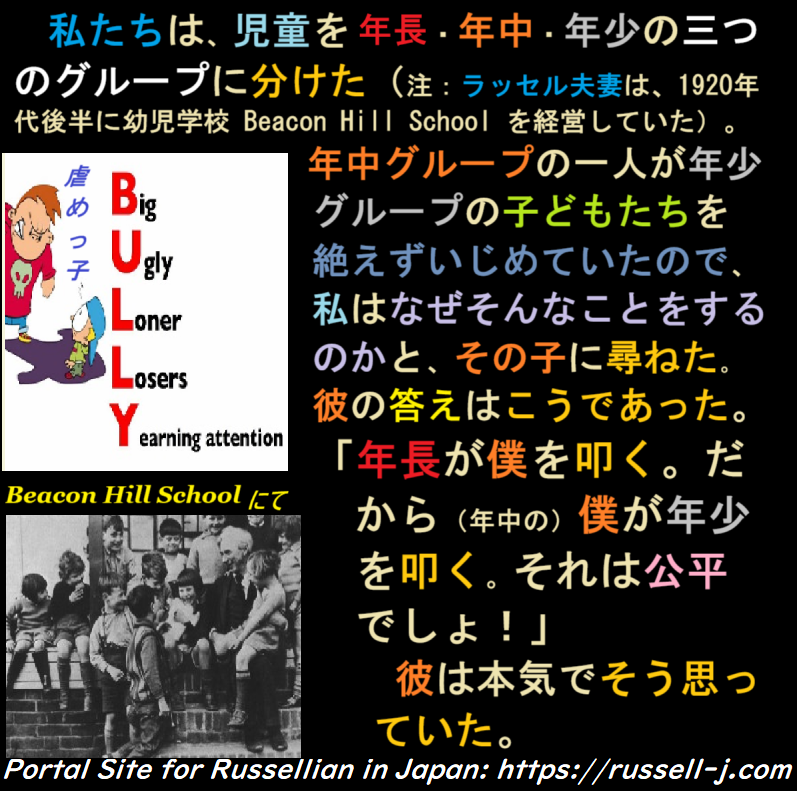
私たちは、児童を年長・年中・年少の三つのグループに分けた(注:ラッセル夫妻は、1920年代後半に幼児学校 Beacon Hill School を経営していた)。年中グループの一人が年少グループの子どもたちを絶えずいじめていたので、私はどうしてそんなことをするのかと、その子に尋ねた。彼の答えはこうであった。「年長が僕をたたく。だから(年中の)僕が年少をたたく。それは公平でしょ!」 彼は本気でそう思っていた。
We divided them (children)into three groups, bigs, middles, and smalls. One of the middles was perpetually ill-treating the smalls, so I asked him why he did it. His answer was: 'The bigs hit me, so I hit the smalls; that's fair.' And he really thought it was.
Source: The Autobiography of Bertrand Russell, v.2
More info.: https://russell-j.com/beginner/AB24-070.HTM
<寸言>
弱者は救済の対象になります。とはいえ、最初のうちは ――いや、時にはかなり長い間―― 見て見ぬふりをされることが少なくありません。そして、いよいよ看過できなくなる段階になってから、ようやく救済に動きます。
しかし、現実には、強い者から虐められると、虐められた者は自分より弱いものを虐めるという現象がしばしば起こります。そして、一番弱い者は誰も虐めることができないため、最も被害を受けることになります。
「本日のラッセルの言葉」に登場する、ある虐めっこの発言 ――「年長が僕を叩く。だから(年中の)僕が年少を叩く。それは公平でしょ!('The bigs hit me, so I hit the smalls; that's fair.')」は、この構造をよく表しています。
この構造は国際関係にも見られます。たとえば、トランプ大統領がある人物(あるいはある国)を叩くと、叩かれた人物(あるいは叩かれた国)はさらに弱い人物(あるいはさらに弱い国)を叩く。では、最も惨めな思いをしている一番弱い国はどこでしょうか? 皮肉な話ですね。
The weak are objects of relief. Nevertheless, at first -- and sometimes for quite a long time -- they are often ignored. Only when the situation can no longer be overlooked do people finally step in to help.
In reality, however, it often happens that when a strong person bullies someone, the victim then bullies someone weaker. As a result, the weakest person, who cannot bully anyone, ends up suffering the most.
A remark by a certain bully, quoted in "Today's Words of Russell" -- "The bigs hit me, so I hit the smalls; that's fair." -- vividly illustrates this structure.
This structure can also be seen in international relations. For example, when President Trump strikes at a certain individual (or a certain country), that individual (or country), in turn, strikes at someone even weaker (or an even weaker country). So, which country, the weakest of all, is suffering the most? A bitter irony indeed.